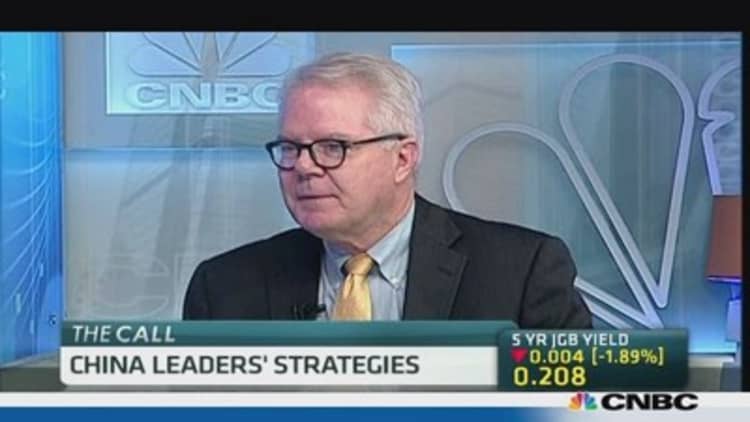Trade in Asian equity markets was subdued on the final trading day of the week after underwhelming U.S. earnings results pulled the plug on Wall Street's two-day rally.
Both the Dow and slipped overnight after Goldman Sachs saw a 21 percent drop in profit and posted lower-than-expected results.
Investors also digested comments from Federal Reserve Chairman Ben Bernanke, who said the central bank should be giving the U.S. economy the stimulus it needs despite worries that quantitative easing may destabilize the financial system.
(Read more: )
Attention now turns to Monday's release of China's fourth quarter gross domestic product (GDP) data. Many economists forecast GDP slowed to 7.6 percent in the final three months of last year, from 7.8 percent in the previous quarter. That would put the full-year growth rate at 7.7 percent, the weakest level since 1999.
Nikkei flat
Renewed profit-taking weighed on Japanese shares, leading the benchmark Nikkei post a 1.1 percent loss for the week. Data showing consumer confidence weakened in December also hit sentiment.
Investors also largely shrugged off news that the government raised its economic assessment for the first time in four months.
(Read more: Why Japan's rocky January won't deter bulls)
Blue-chip stocks were mixed with Toshiba up nearly 2 percent while Sony and shed 1 percent each. Panasonic lost 1.2 percent after deciding to sell a trio of its Southeast Asian semiconductor production facilities to Singapore's United Test and Assembly Center.
Shanghai falls 1%
China's benchmark index came closed at their lowest levels in over five months as the resumption of initial public offerings put a strain on liquidity levels.
Valve maker Neway Valve, the first mainland firm to list on the in more than a year, surged over 30 percent in its debut.
In Hong Kong, shares rose 0.6 percent as the carrier officially began selling the Apple iPhone throughout the mainland.

Sydney flat
Australia's benchmark index lost ground one day after posting its biggest one-day rise in three weeks while the continued to trade at three-and-a-half year lows against the greenback following weak local jobs data on Thursday.
Banks were the hardest hit with National Australia Bank down 1 percent and 0.7 percent lower, tracking declines in U.S. financials.
Super Retail slumped over 16 percent after reporting disappointing first-half results.
Kospi eases 0.6%
Seoul shares hit a one-week closing low after offshore investors sold $94 million worth of local stocks. Still, the benchmark index managed to eke out a 0.3 percent gain for the week.
Banks were the top losers with Hana Financial and Industrial Bank of Korea down 2.5 and 1.6 percent, respectively.
Emerging markets fall
Thailand's benchmark SET index fell 0.47 percent while Indian shares lost 0.9 percent.
— By CNBC.com's Nyshka Chandran. Follow her on Twitter @NyshkaCNBC

